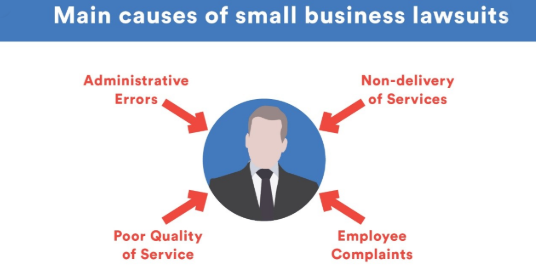How To Reduce Small Business Lawsuits & Some Advice

By Debbie Gregory.
Small business owners will face the threat of a lawsuit at least once over the lifetime of their business. The financial impact of such a lawsuit can be devastating and can even put the company totally out of business. The lawsuit can also damage the company’s reputation, place stress on you and your employees and take valuable time away from other important parts of your business.
Small businesses are sued for a variety of reasons which are usually dependent on their industry. Some reasons for lawsuits include but are not limited to product defects, noncompliance with regulations, breach of contract, and more.
Unfortunately, most lawsuits against small businesses are from unhappy employees. Employees that feel they have been treated unfairly, terminated unjustly, or disciplined in a way they felt was too harsh are more likely to sue if they feel they can gain financial compensation for their perceived mistreatment.
The most common employee-led lawsuits include:
- Discrimination (age, sexual orientation, gender, religion, etc)
- Harassment
- Injury due to negligence
- Wrongful termination
- Salary and/or compensation violations
Occasionally the lawsuits will come from an unhappy customer. Most are legitimate claims against the business but of course occasionally you may run into a frivolous lawsuit. There are some people who make a living out of filing lawsuits. Regardless, the negative impact to your business will be the same.
The most common customer-led lawsuits include:
- Discrimination
- Personal injury
- Refusal of service
- Unlawful activities (such as a hidden camera in the bathroom)
How can you reduce the threat of a lawsuit?
- Protect your assets with the proper insurance coverage. Business liability insurance can protect your personal finances as well as the business finances. Seek the advice of an insurance professional to find the right coverage for your business.
- Make sure you have good legal help ready and waiting just in case. It is always best to get to know a good lawyer that you can turn to for advice or representation when needed.
- Be careful with what you do and say. Never over promise, don’t make ludicrous claims, try to avoid saying anything that may harm you in the future, and never make overly specific claims about your products or services. This includes what is said and done with employees. Make sure all of your policies are clearly written out, easily accessible, consistent with federal, state and local laws and are followed.
If you do happen to get sued, or are threatened with a lawsuit, stay as calm as possible. Your first step will be to contact your lawyer and let them know the situation. Your legal counsel may be able to help mitigate the matter before it goes to court. After speaking with them, if necessary, your second call will be to your insurer to make certain you know the process to file a claim should you need to do so.
Facing any sort of legal matter can be incredibly difficult and highly stressful. Try to keep a cool and level head about the situation. Keeping calm and optimistic can help you focus on the task as well as help you continue to run your business while the matter is handled.
Being prepared is always the best route to go. Make sure your assets and company are protected well before there is a problem and you will be in a better place to either curb a potential lawsuit or tackle it quickly.










